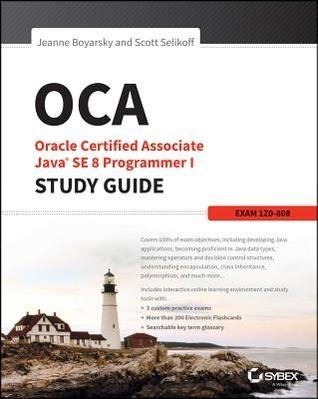Цель заброшена
Автор не отписывался в цели 9 лет 7 месяцев 10 дней
Java SE 8 Programmer I 1Z0-808
| Exam Number: | 1Z0-808 | ||
| Associated Certifications: | Oracle Certified Associate, Java SE 8 Programmer | ||
| Exam Product Version: | Java SE, | ||
| Exam Price: | € 212 |
Duration:150
Number of Questions:77
Passing Score:65%
Validated Against:This exam has been written for the Java SE 8 release
format:Multiple Choice
Критерий завершения
Pass Exam
-
Модуль 1.
-
Урок 1. Введение в Java.
-
Урок 2. Виды языков программирования и место языка Java среди них.
-
Урок 3. Из чего состоит Java.
-
Урок 4. Основы работы в терминале (ознакомительный).
-
Урок 5. Настройка окружающей среды для разработки на языке Java.
-
-
Модуль 2.
-
Урок 1. Введение в ООП.
-
Урок 2. Типы данных в Java.
-
Урок 3. Работа с экземплярами в Java.
-
Урок 4. Пакеты в Java
-
-
Модуль 3.
-
Урок 1*. Основы использования и создания методов в классах. Часть 1.
-
Урок 2. Основы использования и создания методов в классах. Часть 2.
-
Урок 3. Уровни методов в Java.
-
Урок 4. Наследование в Java.
-
Урок 5. Аннотация @Override в Java.
-
-
Модуль 4.
-
Урок 1. Условный оператор IF в Java.
-
Урок 2. Массивы в Java.
-
Урок 3. Циклы в Java.
-
Урок 4. Оператор SWITCH в Java.
-
-
Модуль 5.
-
Урок 1. Уровни доступа в Java.
-
Урок 2. Конструкторы в Java.
-
Урок 3. Неизменяемые объекты.
-
Урок 4. Паттерн проектирования Builder.
-
Урок 5. Перечисления в Java.
-
-
Модуль 6.
-
Урок 1. Составные строки в Java
-
Урок 2. Манипуляции символами.
-
Урок 3. Преобразование строк в числа и обратно.
-
-
Модуль 7.
-
Урок 1. Интерфейсы в Java.
-
Урок 2. Абстрактные классы.
-
Урок 3. Интерфейс List в Java.
-
-
Модуль 8.
-
Урок 1. Nested (static) классы в Java.
-
Урок 2. Inner (non-static) классы в Java.
-
Урок 3. Анонимные классы в Java.
-
-
Модуль 9.
-
Урок 1. Исключения в Java.
-
Урок 2. Иерархия исключений.
-
-
Introduction
-
Module 1 Before You Begin
-
Lesson 1: Why would I take the Oracle Certified Associate Java Programmer Exam
-
Lesson 2: The path to certification
-
Lesson 3: Preparation strategies
-
Lesson 4: Test Taking Strategies
-
-
Module 2 Java Basics
-
Lesson 1: Define the scope of variables
-
Lesson 2: Define the structure of a Java class
-
Lesson 3: Create executable Java applications with a main method; run a Java program from the command line; including console output
-
Lesson 4: Import other Java packages to make them accessible in your code
-
Lesson 5: Compare and contrast the features and components of Java such as: platform independence, object orientation, encapsulation, etc.
-
-
Preparation
Reading 5 days a week
![]()
-
Chapter 1 Java Building Blocks - 47
-
Chapter 2 Operators and Statements - 97
-
Chapter 3 Core Java APIs - 164
-
Chapter 4 Methods and Encapsulation - 211
-
Chapter 5 Class Design - 279
-
Chapter 6 Exceptions - 345
-
Appendix - 435
-
-
Home testing
Стоимость этапа — 910.5 ₽
-
buy test pack
-
Test day
-
Test day
-
Test day
-
Test day
-
Test day
-
Test day
-
Test day
-
Test day
-
Test day
-
Test day
-
Test day
-
Test day
-
Test day
-
Test day
-
-
Register to exam
Стоимость этапа — 19302.6 ₽
-
Find € 212
-
Register
-
Take a day
-
-
Pass exam
-
if(exam.isPassed)me.drinkBeer();else me.drinkBeer();
-
-
Module 3 Working with Java Data Types
-
Lesson 1: Declare and initialize variables (including casting of primitive data types)
-
Lesson 2: Differentiate between object reference variables and primitive variables
-
Lesson 3: Know how to read or write to object fields
-
Lesson 4: Explain an Object's Lifecycle (creation, "dereference by reassignment" and garbage collection)
-
Lesson 5: Develop code that uses wrapper classes such as Boolean, Double, and Integer
-
-
Module 4 Using Operators and Decision Constructs
-
Lesson 1: Use Java operators; including parentheses to override operator precedence
-
Lesson 2: Test equality between Strings and other objects using == and equals ()
-
Lesson 3: Create if and if/else and ternary constructs
-
Lesson 4: Use a switch statement
-
-
Module 5 Creating and Using Arrays
-
Lesson 1: Declare, instantiate, initialize and use a one-dimensional array
-
Lesson 2: Declare, instantiate, initialize and use multi-dimensional array
-
-
Module 6 Using Loop Constructs
-
Lesson 1: Create and use while loops
-
Lesson 2: Create and use for loops including the enhanced for loop
-
Lesson 3: Create and use do/while loops
-
Lesson 4: Compare loop constructs
-
Lesson 5: Use break and continue
-
-
Module 7 Working with Methods and Encapsulation
-
Lesson 1: Create methods with arguments and return values; including overloaded methods
-
Lesson 2: Apply the static keyword to methods and fields
-
Lesson 3: Create and overload constructors; including impact on default constructors
-
Lesson 4: Apply access modifiers
-
Lesson 5: Apply encapsulation principles to a class
-
Lesson 6: Determine the effect upon object references and primitive values when they are passed into methods that change the values
-
-
Module 8 Working with Inheritance
-
Lesson 1: Describe inheritance and its benefits
-
Lesson 2: Develop code that demonstrates the use of polymorphism
-
Lesson 3: Determine when casting is necessary
-
Lesson 4: Use super and this to access objects and constructors
-
Lesson 5: Use abstract classes and interfaces
-
-
Module 9 Handling Exceptions
-
Lesson 1: Differentiate among checked exceptions, RuntimeExceptions and Errors
-
Lesson 2: Create a try-catch block and determine how exceptions alter normal program flow
-
Lesson 3: Describe the advantages of Exception handling
-
Lesson 4: Create and invoke a method that throws an exception
-
Lesson 5: Recognize common exception classes (such as NullPointerException, ArithmeticException, ArrayIndexOutOfBoundsException, ClassCastEx
-
-
Module 10 Working with Selected classes from the Java API
-
Lesson 1: Manipulate data using the StringBuilder class and its methods
-
Lesson 2: Creating and manipulating Strings
-
Lesson 3: Create and manipulate calendar data using...
-
Lesson 4: Declare and use an ArrayList of a given type
-
Lesson 5: Write a simple Lambda expression that consumes a Lambda Predicate expression
-
- 5039
- 31 мая 2015, 09:53
Не пропустите новые записи!
Подпишитесь на цель и следите за ее достижением
Бюджет
20213.1 ₽




